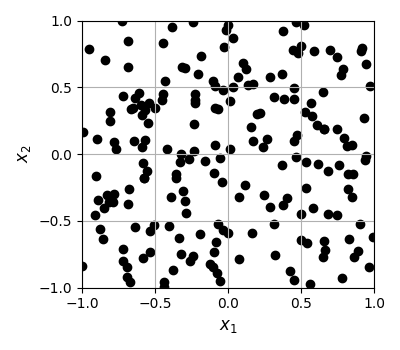Note
Click here to download the full example code
Standard Random sampling#
To calculate the coefficients of the gPC matrix, a number of model evaluations need to be performed to sample the probability space \(\Theta\) and enable the estimation of the polynomials. As for the computation of the coefficients, the input parameters \(\mathbf{\xi}\) can be sampled in a number of different ways. In pygpc the grid \(\mathcal{G}\) for this application is constructed in pygpc/Grid.py.
Example#
In order to create a grid of sampling points, we have to define the random parameters first.

Ellipsis
import pygpc
import numpy as np
import matplotlib.pyplot as plt
from collections import OrderedDict
# define random parameters
parameters = OrderedDict()
parameters["x1"] = pygpc.Beta(pdf_shape=[1, 1], pdf_limits=[-np.pi, np.pi])
parameters["x2"] = pygpc.Beta(pdf_shape=[1, 1], pdf_limits=[-np.pi, np.pi])
# In the case of random sampling the samples will be randomly drawn according to the probability density function (PDF)
# :math:`f(\xi)` of the input parameters.
#
# A simple random grid containing 200 sampling points can be generated by:
grid = pygpc.Random(parameters_random=parameters,
n_grid=200,
options={"seed": None})
# The following options are available for Random grids:
#
# - seed: set a seed to reproduce the grid
#
# The grid points are distributed as follows (in the normalized space between [-1, 1]):
fig = plt.figure(figsize=(4, 3.5))
plt.scatter(grid.coords_norm[:, 0], grid.coords_norm[:, 1], c="k")
plt.xlabel("$x_1$", fontsize=12)
plt.ylabel("$x_2$", fontsize=12)
plt.xlim([-1, 1])
plt.ylim([-1, 1])
plt.xticks(np.linspace(-1, 1, 5))
plt.yticks(np.linspace(-1, 1, 5))
plt.grid()
plt.tight_layout()
# For each gPC algorithm, the sampling method can be selected accordingly by setting the following options
# when setting up the algorithm:
options = dict()
...
options["grid"] = pygpc.Random
options["grid_options"] = {"seed": None}
...
# When using Windows you need to encapsulate the code in a main function and insert an
# if __name__ == '__main__': guard in the main module to avoid creating subprocesses recursively:
#
# if __name__ == '__main__':
# main()
Total running time of the script: ( 0 minutes 0.113 seconds)